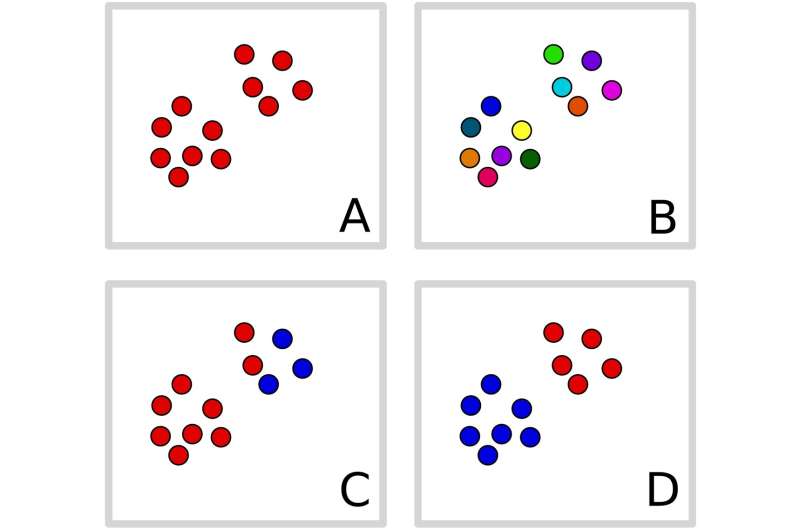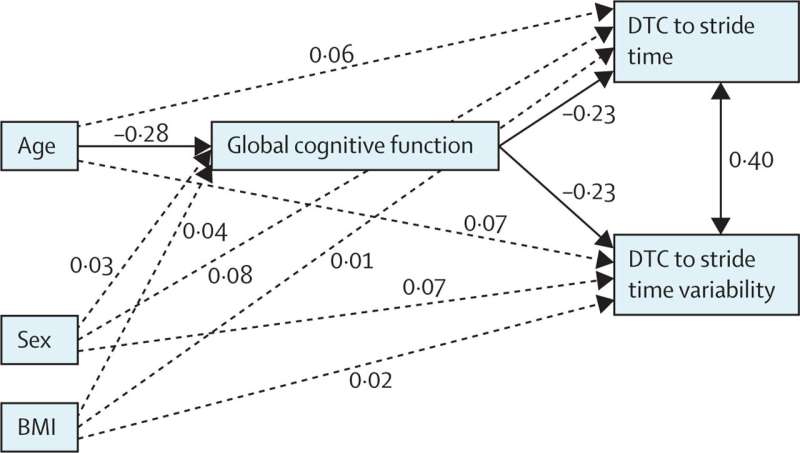
Is a canine extra very similar to a white meat or an eagle? Is a penguin noisy? Is a whale pleasant?
Psychologists on the College of California, Berkeley, say those absurd-sounding questions may lend a hand us higher perceive what is on the middle of a few of society’s maximum vexing arguments.
Analysis revealed on-line Thursday within the magazine Open Thoughts displays that our ideas about and associations with even probably the most elementary phrases range broadly. On the similar time, other people generally tend to seriously overestimate what number of others cling the similar conceptual ideals—the psychological groupings we create as shortcuts for figuring out an identical gadgets, phrases or occasions.
It is a mismatch that researchers say will get on the middle of probably the most heated debates, from the court to the dinner desk.
“The effects be offering an reason for why other people communicate previous each and every different,” mentioned Celeste Kidd, an assistant professor of psychology at UC Berkeley and the learn about’s fundamental investigator. “When individuals are disagreeing, it would possibly not all the time be about what they suspect it’s. It may well be stemming from one thing so simple as their ideas now not being aligned.”
Easy questions like, “What do you imply?” can move far in combating a dispute from going off the rails, Kidd mentioned. In different phrases, she mentioned, “Simply hash it out.”
Disagreements about observe meanings are not new. From interpretations of the Charter to definitions about what a reality is, semantic disputes have lengthy been on the heart of prison, philosophical and linguistic considering. Cognitive psychologists have likewise studied those variations in how other people understand and describe the sector. The buildup of our lived studies impacts how we conceptualize the sector and is helping give an explanation for why two other people manner issues in several tactics—and even agree if one thing is an issue within the first position.
However measuring simply how a lot the ones ideas range is a long-standing thriller.
To lend a hand comprehend it somewhat higher, Kidd’s group recruited greater than 2,700 members for a two-phase venture. Contributors within the first section had been divided in part and requested to make similarity judgements about whether or not one animal—a finch, as an example—used to be extra very similar to considered one of two different animals, like a whale or a penguin. The opposite part had been requested to make similarity judgments about U.S. politicians, together with George W. Bush, Donald Trump, Hillary Clinton and Joe Biden. The researchers selected the ones two classes as a result of individuals are much more likely to view not unusual animals in a similar way; they would have extra shared ideas. Politicians, then again, may generate extra variability, since other people have distinct political views.
However they discovered important variability in how other people conceptualized even elementary animals.
Take penguins. The chance that two other people decided on at random will percentage the similar thought about penguins is round 12%, Kidd mentioned. That is as a result of individuals are disagreeing about whether or not penguins are heavy, possibly as a result of they have not lifted a penguin.
“If other people’s ideas are completely aligned, then all of the ones similarity judgments must be the similar,” Kidd mentioned. “If there is variability in the ones judgments, that tells us that there is something compositionally that is other.”
Researchers additionally requested members to bet what proportion of other people would believe their particular person responses. Contributors tended to consider—incessantly incorrectly—that kind of two-thirds of the inhabitants would believe them. In some examples, members believed they had been within the majority, even if necessarily no one else agreed with them.
It is a discovering befitting of a society of other people satisfied they are proper, when they are if truth be told mistaken.
Total, two other people picked at random all the way through the learn about time-frame of 2019-2021 had been simply as more likely to have agreed as disagreed with their solutions. And, possibly unsurprisingly in a polarized society, political phrases had been a ways much less more likely to have a unmarried that means—there used to be extra confrontation—than animal phrases.
“Other folks don’t seem to be acutely aware of that misalignment,” Kidd mentioned. “Other folks usually overestimate the level to which other folks will percentage the similar thought as them when they are talking.”
An exception? Other folks had been usually at the similar web page when it got here to the observe “eagle.”
In a 2d section of the venture, members indexed 10 single-word adjectives to explain the animals and the politicians. Contributors then rated the animals’ and politicians’ options—”Is a finch good?” used to be an instance of a query they had been requested.
Once more, researchers discovered that individuals differed radically in how they outlined elementary ideas, like about animals. Maximum agreed that seals don’t seem to be feathered, however are slippery. On the other hand, they disagreed about whether or not seals are sleek. And whilst most of the people had been in settlement that Trump isn’t humble and is wealthy, there used to be important confrontation about whether or not he’s fascinating.
This analysis is vital, Kidd mentioned, as it additional displays how most of the people we meet is not going to have the very same thought of ostensibly uncomplicated issues, like animals. Their ideas may if truth be told be radically other from each and every different. The analysis transcends semantic arguments, too. It might lend a hand monitor how public perceptions of primary public insurance policies evolve through the years and whether or not there is extra alignment in ideas or much less.
“When individuals are disagreeing, it would possibly not all the time be about what they suspect it’s,” Kidd mentioned. “It may well be stemming from one thing so simple as their ideas now not being aligned.”
Additional info:
Louis Marti et al, Latent Variety in Human Ideas, Open Thoughts (2023). DOI: 10.1162/opmi_a_00072
Quotation:
I say canine, you assert white meat? New learn about explores why we disagree so incessantly (2023, March 17)
retrieved 7 April 2023
from https://medicalxpress.com/information/2023-03-dog-chicken-explores.html
This record is topic to copyright. With the exception of any honest dealing for the aim of personal learn about or analysis, no
phase is also reproduced with out the written permission. The content material is supplied for info functions most effective.
Supply By way of https://medicalxpress.com/information/2023-03-dog-chicken-explores.html



